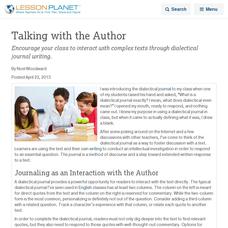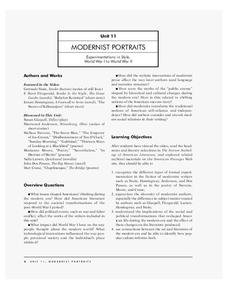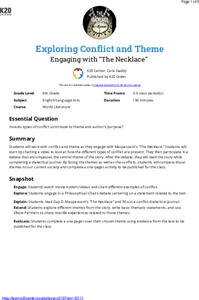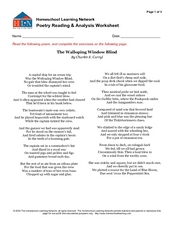Maryland Department of Education
The Concept of Diversity in World Literature Lesson 12: Author's Purpose - Yeats and Achebe
Is there such a thing as fate/luck? Can one fight destiny? As part of their study of Chinua Achebe's purpose in writing Things Fall Apart, class members answer these questions from Achebe's point of view and then from William Butler...
Curated OER
Talking with the Author
Encourage your class to interact with complex texts through dialectical journal writing.
Curated OER
How Different Authors Treat Similar Themes - Elephants of Africa
Students watch videos about similar themes presented by two different authors about elephants and their relationship with humans. In this theme analysis lesson, students watch video segments, visit the given websites, and complete...
Star Wars in the Classroom
"Shakespeare and Star Wars": Lesson Plan Day 1
"Now is the summer of our happiness/Made winter by this sudden, fierce attack!" Luke Skywalker meets Hamlet in a 10-instructional activity unit based on Ian Doescher's William Shakespeare's Star Wars: Verily, a New Hope. Using Star Wars®...
Annenberg Foundation
Modernist Portraits
How did literature reflect people's attitudes in post-World War I America? A lesson explores the topic using a variety of activities. Individuals watch and respond to a video; read author biographies and engage in discussion; write...
Annenberg Foundation
Rhythms in Poetry
Rhyme, rhythm, free verse, imagery: Do these words describe poetry, or jazz music? The answer is both! A resource explores these similarities as scholars watch a video, engage in discussion, read author biographies, write poetry and...
Annenberg Foundation
Poetry of Liberation
How do writers use words to protest injustice, challenge the status quo, and shape their own identities? Individuals watch and discuss a video, read author biographies, write poetry and journals, develop a slideshow, and complete a...
Annenberg Foundation
Social Realism
Many American writers in the late nineteenth century wanted their writing to reflect real life. Individuals watch and discuss a video, read and explore author biographies, write a journal entry and a poem, and complete a multimedia...
Annenberg Foundation
Migrant Struggle
The American Dream is a goal that many pursue, but is it truly attainable for all people? An in-depth lesson explores the plight of migrants in twentieth-century America. The resource includes a video and author biographies and...
Deer Valley Unified School District
Close Reading: Analyzing Mood and Tone
The AP Literature and Composition exam is all about close reading. Test takers are presented with a passage and asked to analyze how an author uses literary devices to create a desired effect. Prepare your students for the exam with a...
Reed Novel Studies
Of Mice and Men: Novel Study
Why is personification such a popular literary device for many authors? Learners answer the question as they engage in activities from the novel study for the classic Of Mice and Men. They also scan the novel to find examples of the...
College Board
1999 AP® English Language and Composition Free-Response Questions
A released Advanced Placed exam provides scholars with an opportunity to practice their English language and composition skills. After reading two passages about Florida's Okefenokee Swamp, they write essays analyzing how the distinctive...
Prestwick House
The House on Mango Street Activity Pack
Enrich a unit on The House on Mango Street by Sandra Cisneros with a selection of related activities. The packet contains nine activities that go from pre-reading through wrapping up the novel. Young readers work on studying author's...
K20 Learn
Annotating a Text: Style and Syntax
New ReviewIf you have a favorite author, you probably recognize their style. Conduct a close read of the text, marking it up as they go. Collaborative sharing time and a summary writing prompt follow the main activity.
Helena-West Helena School District
I Know Why the Caged Bird Sings Instructional Unit Plan
Maya Angelou's first autobiography, I Know Why the Caged Bird Sings, demonstrates both the author's exemplary writing and the themes of gender and racial injustice that perpetuate beyond the limits of the 20th century. Use a thorough...
Simon & Schuster
Classroom Activities for The Count of Monte Cristo by Alexandre Dumas
Alexandre Dumas' The Count of Monte Cristo is the featured text in three classroom activities. The first activity asks readers to analyze the description of Edmond Dantes in Chapter XVII, paying particular attention to Dumas' word choice...
National Endowment for the Humanities
Literary Genres in “Moby-Dick”
Moby Dick is more than a whale of a tale narrated by Ishmael. A lesson studying Herman Melville's classic novel asks readers to examine the different genres the author weaves into his story. Instructors model how to conduct a stylistic...
K20 LEARN
Exploring Conflict And Theme: Engaging With "The Necklace"
Teach young scholars how to determine the theme of a story, an insight the author wants to share with readers, with a lesson that uses Guy de Maupassant's "The Necklace" as an anchor text. Learners examine the internal and external...
Curated OER
Imitating An Author's Style
Young scholars explore author's style. For this literature lesson, students read and take notes on a short story of their choice. Young scholars write an original short story imitating the author's style.
Curated OER
The Romantic Period
What does the term romantic mean? As you introduce your class to the Romantic period and famous authors, artists, and musicians from the time period, make sure they know what sets this movement apart from previous movements! Several...
Planet e-Book
Dubliners
The Dubliners contains 15 short stories all bound in one book. The stories begin with narration by young children, and as they progress, so do the ages of the narrators. The author, James Joyce, focuses most stories on characters that...
Curated OER
Poetry Reading: Analysis Worksheet
Explore poetry by reading the poem "The Walloping Window Blind" by Charles E. Carryl, and completing an analysis with your class. The activity provides the entire poem, a graphic organizer to help with summarizing and paraphrasing, and...
Vanier College
Analyzing Short Stories/Novels
Good questions can help focus readers' attention on the elements writers use to add depth to their stories. The questions on this worksheet do just that and encourage readers to think critically about a story and author's purpose.
Free Library of Philadelphia
Resources for Ghost Boys
Jewell Parker Rhodes, the author of Ghost Boys, wanted to bring the historical legacy of Emmett Till and the current topic of racial prejudice into today's young readers' mindsets. Use a reading guide and set of discussion questions to...
Other popular searches
- Authors Purpose
- Author's Purpose
- Author Study
- Authors Point of View
- Authors Purpose Powerpoint
- Authors Purpose Mini Lesson
- Author Research
- Authors Purpose Passage
- Georgia Authors
- Authors Study
- Teaching Author's Purpose
- Student Authors

























